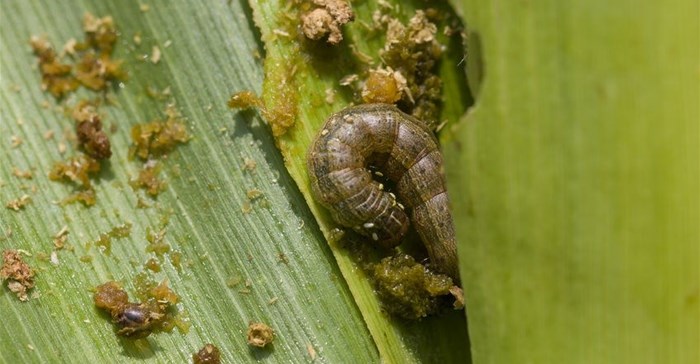Experts call for multi-pronged approach to fight Fall armyworm in Africa

Prasanna, who was speaking during a stakeholders' consultative meeting on the fall armyworm in Nairobi last week, added that there is also need for a massive awareness campaign and scientific innovative approaches to tackling the pest.
Africa could lose an estimated $3 billion worth of maize in the coming year...
The Fall armyworm is native to the Americas and attacks over 80 different plant species, including maize, a major food staple in sub-Saharan Africa on which more than 200 million people depend. The female Fall armyworm can lay up to 1,000 eggs at a time and can produce multiple generations very quickly without pause in tropical environments.
"We cannot eliminate the pest from Africa, but we can provide support to farmers and give them options to manage their crops against the Fall armyworm," Prasanna pointed out.
Africa could lose an estimated $3 billion worth of maize in the coming year, according to Roger Day, sanitary and phytosanitary coordinator at the Center for Agricultural and Biosciences International (CABI).
The Fall armyworm has been reported in all countries in southern Africa except Lesotho, plus most countries in eastern Africa, including Kenya, Tanzania, Uganda, Rwanda, Ethiopia, and Burundi. It has also been reported in several countries in West and Central Africa, including Nigeria, Ghana, Benin, Togo, Democratic Republic of Congo and the island nation of Sao Tome Principe.
"We just don't know how far this could go," said Joe DeVries, the vice president for programme development and innovation at the Alliance for a Green Revolution in Africa (AGRA).
"Fall armyworm is a very recently introduced pest in Africa and even the experts are unsure what its long-term impact will be. That's why we need to urgently support national plant protection groups to work with farmers in controlling the level of damage on their farms. However, only a collaborative effort between international and national agencies can provide a solution in the long-term."
Integrated management
Among options explored by various governments is to provide emergency pesticides to smallholder farmers. However, this costly option can deliver only mixed success due to plant resistance to the chemicals used.
"The first step to an effective integrated pest management strategy is to survey and monitor pest movements, yield loss levels and to compile data using remote sensing equipment and at the field level," said Gabriel Rugalema, the Food and Agriculture Organisation (FAO) country representative for Kenya.
"Accumulated data can contribute to establishing uniform cross-continent government standards for identifying and fighting the pest. We need to act fast, failure is not an option," Rugalema said, adding that adequate funding and taking a regional approach to controlling the Fall armyworm are vital.
Future challenge
Scientists believe that the fall armyworm may have spread and proliferated on the continent due to warmer global temperatures over the past few years. "We need to develop and deploy and fast-track improved drought tolerant, disease resistant hybrids adapted to Africa that is also resistant to the Fall armyworm," Prasanna said.
"This is possible in the medium-term of five to six years, while other effective integrated pest management options are scaled-up and delivered to the farming communities," he added.
Building resilience
Despite the challenges, we are continuing to build resilience, increase agricultural productivity and regional coordination on agriculture, said Candace Buzzard, deputy mission director of the US Agency for International Development (USAID) in Kenya and East Africa.
"Resilience is the ability of communities, countries, and systems to respond to shocks," she said. "Hopefully, by building more resilience within all these systems, which includes early warning, which includes the farmer level, by building resilience we can reduce the effects of these shocks and be more prepared for them."
Some ideas for building resilience and combatting the Fall armyworm: combination of cultural, biological and biopesticide control, develop host plant resistance (conventional and transgenic), low-cost chemicals, protective clothing, spraying equipment; heat, drought, pest resistant hybrid crops; heat drought, pest-resistant genetically modified crops, identification of predatory insects, pheromone traps to lure moths to target and destroy eggs and larvae, use of biopesticides for natural distribution by birds or other animals, tools allowing labourers to pluck pests out of plants, and building a strong communications network about the pest.
Source: allAfrica

AllAfrica is a voice of, by and about Africa - aggregating, producing and distributing 2000 news and information items daily from over 130 African news organisations and our own reporters to an African and global public. We operate from Cape Town, Dakar, Lagos, Monrovia, Nairobi and Washington DC.
Go to: http://allafrica.com/Related
#Budget2025: Pushback over Fikile's D-Day announcement 8 Apr 2025 Kenya HIV patients live in fear as US aid freeze strands drugs in warehouse 13 Mar 2025 US withdraws from Just Energy Transition partnership with SA 10 Mar 2025 No-shows, aid cuts mar G20 meet on global poverty 27 Feb 2025 USAID workforce reduced by 97% 7 Feb 2025 "Trump’s aid review is a win for Africa" 6 Feb 2025






















